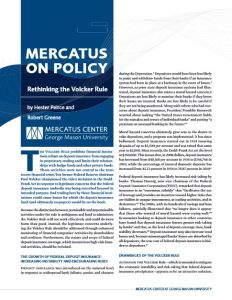
Read or listen offline
автоматическое преобразование текста в аудио
1×
автоматическое преобразование текста в аудио
Recommendation
To protect consumers following the 2008 financial crisis, the United States introduced the 2010 Dodd-Frank Act containing the Volcker Rule, which forbids financial institutions that rely on deposit insurance from proprietary trading. The aim was to reduce the moral hazard that entices banks to take excessive risks. Authors Hester Peirce and Robert Greene condemn the Volcker Rule and assert that market participants, not regulators, should monitor banks. Though always politically neutral, getAbstract believes this provocative article will ignite debate among economists and policy makers across the political spectrum.
Take-Aways
About the Author
Hester Peirce is a senior research fellow at the Mercatus Center, where Robert Greene is a research associate.
By the same author
Book
Book
Book
Book


















Comment on this summary or Начать обсуждение